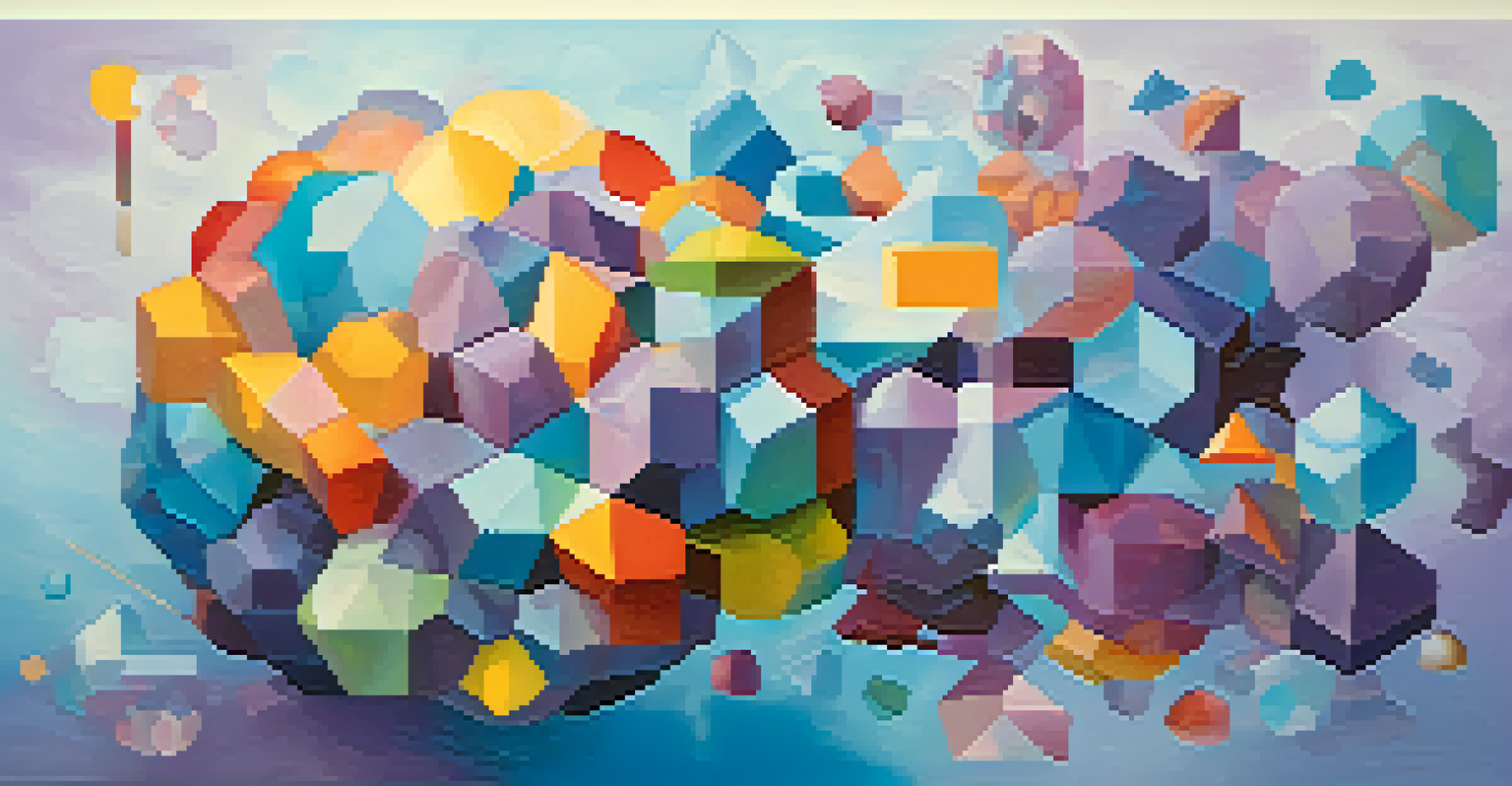Entheogens and Brain Function: Enhancing Cognitive Flexibility

What Are Entheogens? Understanding Their Role in Cognition
Entheogens are substances that can alter consciousness and are often used in spiritual or ceremonial contexts. Derived from the Greek words 'entheos' meaning 'full of the divine' and 'genes' meaning 'born of' or 'producing', these substances include plants like psilocybin mushrooms and ayahuasca. They have been used for centuries across various cultures to enhance spiritual experiences and self-awareness.
The greatest discovery of my generation is that a human being can alter his life by altering his attitude.
Recent studies suggest that entheogens can also influence brain function, particularly in the area of cognitive flexibility. Cognitive flexibility is the mental ability to switch between thinking about different concepts or to think about multiple concepts simultaneously. This flexibility is crucial for problem-solving and adapting to new situations in our rapidly changing world.
By understanding the properties of entheogens, we can begin to explore their potential benefits beyond traditional uses. This opens up exciting possibilities for enhancing our cognitive capabilities and addressing mental health issues. As we delve deeper into their effects, we can uncover valuable insights that may reshape our approach to mental wellness.
The Science Behind Entheogens and Brain Function
Research into how entheogens affect the brain is still emerging, but initial findings are promising. These substances often interact with serotonin receptors, which play a crucial role in regulating mood, cognition, and perception. By altering serotonin transmission, entheogens can lead to shifts in consciousness that may enhance creative thinking and problem-solving abilities.

For instance, studies have shown that psilocybin can promote neural plasticity, the brain's ability to reorganize itself by forming new neural connections. This process is essential for learning and adapting to new information. When exposed to entheogens, some participants reported heightened creativity and a greater ability to approach problems from different angles.
Entheogens and Cognitive Flexibility
Entheogens have the potential to enhance cognitive flexibility, enabling individuals to adapt their thinking and problem-solving approaches more effectively.
Moreover, the experience of using entheogens can lead to profound shifts in perspective. Many users describe feelings of interconnectedness with their surroundings and a deeper understanding of themselves. These experiences can foster a greater sense of cognitive flexibility, allowing individuals to approach challenges with an open mind and a willingness to explore unconventional solutions.
Cognitive Flexibility: What It Is and Why It Matters
Cognitive flexibility is the mental skill that allows us to switch our thinking and adapt to new, unexpected situations. Imagine trying to solve a puzzle with a missing piece; cognitive flexibility helps you find alternative strategies to complete it, rather than getting stuck. It’s an essential component of critical thinking and is vital for personal and professional growth.
We cannot solve our problems with the same thinking we used when we created them.
This skill is particularly important in today’s fast-paced world, where we frequently face new information and challenges. People who possess high cognitive flexibility tend to perform better in collaborative environments because they can adjust their thoughts and approaches based on feedback from others. This adaptability enables them to thrive in dynamic situations.
By enhancing cognitive flexibility, we can improve our decision-making processes and emotional resilience. This is where entheogens come into play, as their potential to promote this flexibility can lead to lasting benefits in both personal and professional realms. Understanding how to harness this power can ultimately contribute to more effective problem-solving and innovative thinking.
How Entheogens Enhance Cognitive Flexibility
Entheogens may enhance cognitive flexibility by inducing altered states of consciousness that break down rigid thought patterns. Users often report experiencing a flow state, where ideas and solutions come more easily and are integrated in novel ways. This state of mind allows individuals to explore possibilities they may not have considered otherwise.
During these experiences, the brain often engages in increased connectivity between different regions, creating a network of thoughts that encourages creative problem-solving. This heightened state of connectivity can lead to 'aha' moments, where solutions become clear, and insights emerge effortlessly. The brain’s ability to connect disparate ideas is crucial for innovative thinking.
Therapeutic Benefits of Entheogens
Research suggests that entheogens can be integrated into therapy to facilitate emotional processing and promote breakthroughs in mental health treatment.
Furthermore, the introspective nature of entheogenic experiences can lead to a better understanding of personal challenges and emotional barriers. By addressing these issues in a profound way, individuals may find themselves more open to new perspectives and solutions, thus enhancing their cognitive flexibility. This process not only benefits the individual but can also have positive ripple effects in their relationships and communities.
Practical Applications in Therapy and Personal Growth
The therapeutic potential of entheogens is gaining traction in mental health treatment. Therapists are beginning to explore how these substances can be integrated into therapy sessions to enhance cognitive flexibility and emotional processing. For example, using psilocybin in a controlled environment has shown promise in treating conditions like depression and anxiety.
By helping patients confront and reframe their thoughts, entheogens can facilitate breakthroughs that traditional therapies might not achieve. This opening of the mind can lead to new insights about one's life, relationships, and behaviors, ultimately promoting healing and growth. Such therapy environments prioritize safety and support, ensuring that users can integrate their experiences effectively.
Moreover, the personal growth potential of entheogens extends beyond therapy. Many individuals seek these experiences for self-discovery and spiritual awakening. By enhancing cognitive flexibility, entheogens can help users break free from limiting beliefs, fostering a greater sense of purpose and clarity in their lives. This journey of self-exploration can lead to profound changes in how we perceive ourselves and our place in the world.
Challenges and Considerations in Using Entheogens
While the potential benefits of entheogens are compelling, it’s important to approach their use with caution. Not everyone reacts the same way to these substances, and factors such as dosage, setting, and individual mental health history can significantly influence outcomes. Responsible use, often in a guided or therapeutic setting, is essential to minimize risks.
Additionally, the legal status of many entheogens can pose challenges for those interested in exploring their benefits. In some regions, these substances remain classified as illegal drugs, limiting access to those who may benefit from their use. Advocates argue for more research and policy reform to allow for safe, regulated use in therapeutic contexts.
Cautions in Using Entheogens
While entheogens offer promising benefits, responsible use and awareness of individual reactions, legal status, and potential psychological risks are essential.
Lastly, potential psychological risks should not be overlooked. While many report positive experiences, there can also be adverse reactions, including anxiety or paranoia. It’s crucial for individuals to educate themselves and consider their mental health status before engaging with entheogens. Creating a supportive and informed environment can help maximize the positive aspects while minimizing potential downsides.
The Future of Entheogens and Cognitive Flexibility Research
As research continues into the effects of entheogens on brain function and cognitive flexibility, we can expect exciting developments in both science and therapy. Ongoing studies aim to uncover not only how these substances work but also their long-term effects on mental health and cognitive abilities. This knowledge could pave the way for new treatment modalities and enhance our understanding of consciousness.
Moreover, the growing interest in mindfulness and holistic approaches to mental health suggests a shift in public perception toward entheogens. As more people share positive experiences, the stigma surrounding these substances may diminish, leading to increased openness about their potential benefits. This cultural shift could foster a more accepting environment for research and therapeutic applications.

In conclusion, the intersection of entheogens and cognitive flexibility presents a fascinating frontier in understanding the human mind. By embracing this research, we can potentially unlock new avenues for personal growth and therapeutic practices, ultimately enhancing our cognitive capabilities and enriching our lives.